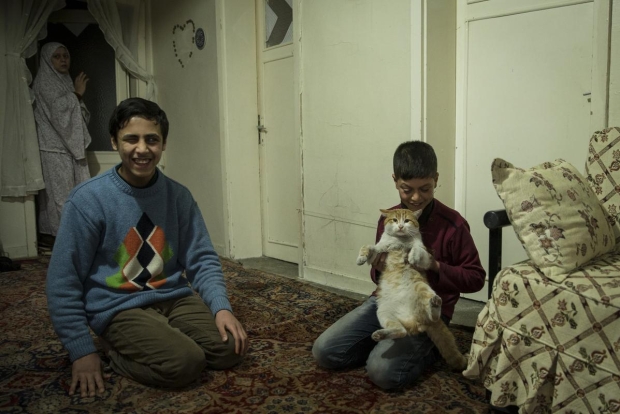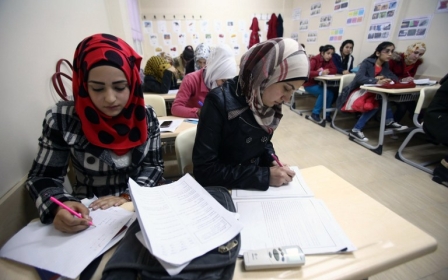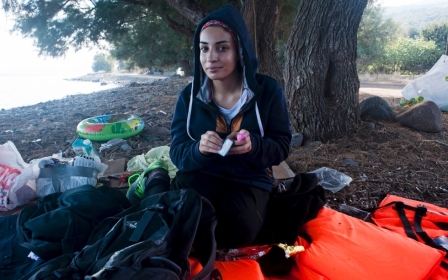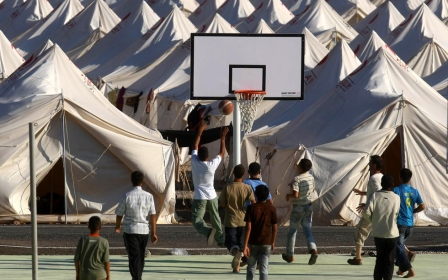Teenaged blind brothers from Aleppo dream big in Ankara
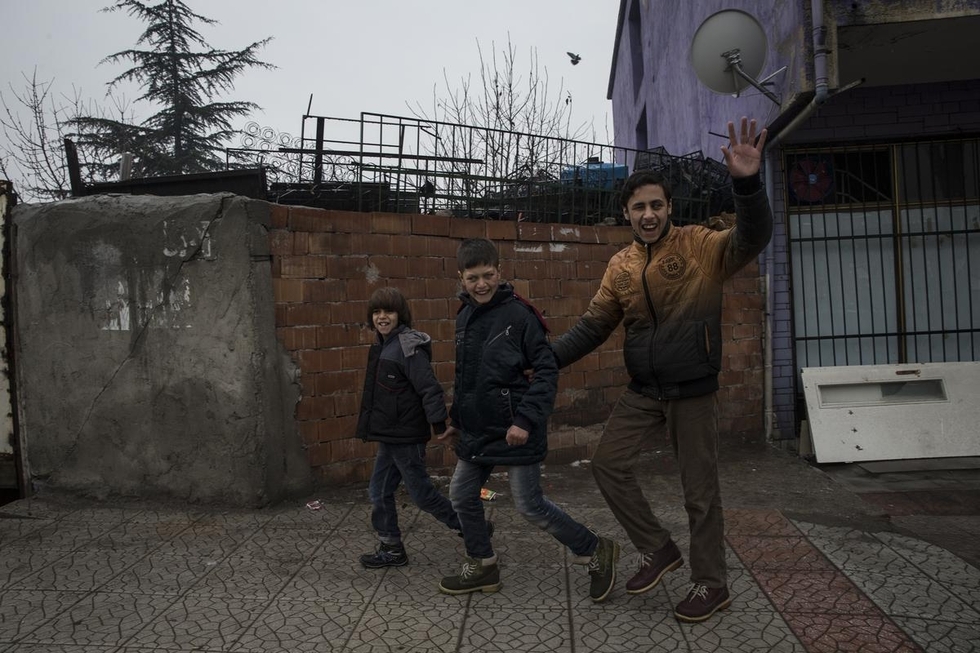
By Servet Gunerigok
The lives of two teenaged blind brothers from Aleppo may seem hopeless on the outside, but Ammar Atiye and Muhammed Atiye harbour dreams of becoming scholars in Ankara someday.
Their eyes are as white as snow, but their dreams are as colourful as the grape purple paint on the outer walls of their informal learning centre building on Onder Street in the outskirts of a poor neighbourhood in the Turkish capital.
The Atiye brothers were born blind, but it is believed that doctors can cure their blindness if a donor pays for their expensive treatment.
But while they await the arrival of such a miracle, the Syrian duo rely on learning the word of God for hope and support. With their fingers on a Braille Quran at the centre named Madrasa-tul-Tafawwuq (Arabic for School of Success), the brothers told Anadolu Agency about their will to learn the Turkish language and science as well as their high aim to don the robes of a religious scholar someday.
The brothers arrived with their family in Turkey in 2014. Thirteen-year-old Ammar recalled his normal life in Aleppo’s al-Shaar neighbourhood before it came under attack by the Bashar al-Assad government. He remembered how the family moved to Tel Jibin village and sought shelter there for eight months as their father abandoned them and then came back to take them to safety in Turkey.
The older brother Muhammed, aged 17, said that although they now live in safety in Turkey, they want to pursue high school and university education like other youth their age. He wishes he could own a laptop that could help him with his special needs education.
While the opportunities provided at the centre are nowhere near what the Syrian children, especially those with special needs, aspire to, it is a small step to enable people like the two blind brothers from Aleppo to get a second chance in life.
The man behind the centre, 25-year-old Syrian Yusuf Mohamad, told Anadolu Agency that he got the idea of educating Syrian children while being involved in humanitarian work.
"While distributing humanitarian aid to Syrians, I found out that something was amiss," Mohamad said.
"Education," he said in his cold office-like room in the dilapidated building. "Syrian children [here] were killing their time in front of television sets and on the streets learning how to swear," Mohamad said, adding that he wants to keep children off the streets.
But while Mohamad's efforts are commendable, a lot more will be needed to keep all children off the streets. Outside the centre, several could be seen standing around a fire to keep themselves warm in the biting cold, while some children could also be seen selling second-hand shoes at Onder Street, which has been a hub for nearly 40,000 Syrians seeking shelter in Ankara.
Meanwhile, Mohamad explained how children at his centre remain scarred by the war in Syria.
"When some children hear the sound of lightning, they say 'planes are coming' and try to hide [themselves in the small classrooms]. Some were also drawing blood and tanks [during their initial days at the centre], but now they are drawing flowers and mosques," he said.
There are two separate buildings for male and female students at the centre, which is run locally with the support of volunteers. Around 300 students, including 200 male students, are taught the Quran alongside mathematics, biology, geography and Turkish language here.
Mohamad recalled the humble origins of his centre when it lacked even proper heating in 2013. He said the endeavour would not have been possible without the support of his Turkish and Syrian friends.
"I sought the help of my friends in Syria first; the one who was studying mathematics came and began teaching it here, then another one who was studying theology came to teach as well," he added.
Some Turkish volunteers heard about the centre and 25 were now helping students learn the Turkish language, Mohamad said, adding that his "Turkish brothers" also helped in providing educational materials. A private Syrian school in southeastern Gaziantep province also gave the centre textbooks and notebooks.
While the large majority of children at the centre do not have special needs like the two brothers, many have missed out on school for so long that they hardly know the alphabet.
Ali Shihabi, the teacher of mathematics at the centre, said that most Syrian children at the centre had not received any formal education during the last three years, and some didn’t even have basic education.
"There are some 12-year-old children who have just learnt the alphabet," Shihabi said.
The task before the government and private organisations to help Syrian children remains daunting. Syria’s devastating civil war, now in its fifth year, has so far left at least 250,000 people dead, according to the UN, while Turkey hosts 2.5 million Syrians plus since the war started.
According to Yusuf Buyuk, a deputy undersecretary at the education ministry, some 300,000 Syrian refugees who fled their country due to the civil war are currently being offered education in Turkey, with great efforts being made to integrate Syrians into the education system in the country's 81 provinces.
While centres like Yusuf Mohamad's on Onder Street run independently, they effectively assist the Turkish government's plan to educate all Syrian refugee children in the country.
Although the School of Success's true success will be known only in the years to come, it is already making a difference.
Hassan Jumma, a 12-year-old child also from Aleppo, was one star example at the centre, who spoke fluent Turkish with Anadolu Agency. "I am very happy with my teachers here," he said.
Another 12-year-old, Abdul Azeez Mohamed, who has been in Ankara for the last seven months, said: "May Allah be pleased with them, it [the centre] has numerous benefits. I am learning some science and some Quran," he said.
New MEE newsletter: Jerusalem Dispatch
Sign up to get the latest insights and analysis on Israel-Palestine, alongside Turkey Unpacked and other MEE newsletters
Middle East Eye delivers independent and unrivalled coverage and analysis of the Middle East, North Africa and beyond. To learn more about republishing this content and the associated fees, please fill out this form. More about MEE can be found here.


